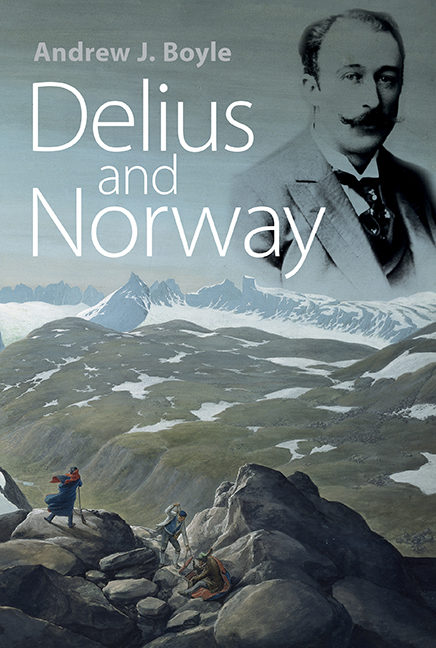Book contents
- Frontmatter
- Dedication
- Contents
- List of illustrations and tables
- Preface
- Abbreviations
- Selected glossary of landscape terms used in place names
- 1 Norway's awakening
- 2 1862–1888: Bradford, Florida and Leipzig
- 3 1888–1889: With Grieg on the heights
- 4 1890–1891: ‘C'est de la Norderie’
- 5 1892–1895: Norway lost
- 6 1896: Norway regained
- 7 1897: Front page news
- 8 1898–1902: Unshakeable self-belief
- 9 1903–1907: Breakthrough in Germany and England
- 10 1908–1912: Changes of direction
- 11 1912–1918: High hills, dark forests
- 12 1919–1934: Myth and reality in Lesjaskog
- Appendix I List of visits to Norway
- Appendix II Works with Norwegian and Danish texts and associations
- Selected bibliography and archival sources
- Index
11 - 1912–1918: High hills, dark forests
Published online by Cambridge University Press: 30 August 2017
- Frontmatter
- Dedication
- Contents
- List of illustrations and tables
- Preface
- Abbreviations
- Selected glossary of landscape terms used in place names
- 1 Norway's awakening
- 2 1862–1888: Bradford, Florida and Leipzig
- 3 1888–1889: With Grieg on the heights
- 4 1890–1891: ‘C'est de la Norderie’
- 5 1892–1895: Norway lost
- 6 1896: Norway regained
- 7 1897: Front page news
- 8 1898–1902: Unshakeable self-belief
- 9 1903–1907: Breakthrough in Germany and England
- 10 1908–1912: Changes of direction
- 11 1912–1918: High hills, dark forests
- 12 1919–1934: Myth and reality in Lesjaskog
- Appendix I List of visits to Norway
- Appendix II Works with Norwegian and Danish texts and associations
- Selected bibliography and archival sources
- Index
Summary
‘all the poetry & melancholy of the Northern summer & the high mountain plateaus’
Letter from Delius to Henry Clews, 20 June 1918The Song of the High Hills can be regarded as a true culmination – a ‘crowning peak’ – of over a hundred years of musical attempts to associate or equate musical expressions with mountain nature, as interpreted in a Romantic aesthetic. For Delius's work to rise to this height, three different timelines had to cross at the right moment:
• He was at a moment in his life, marked by the vicissitudes of ill health and middle age, when his personal outlook seems to have magnified for him the frailty of human existence and the intransience of nature;
• He was at a moment in Western music when it was becoming easier for composers to distance themselves from Austro-German traditions;
• He was at a moment in Western civilisation when scientific enquiry had given individuals new understanding of their place in historical time and the eternity of the cosmos.
Before we turn to look in some detail at the score, it will be useful to trace how these three timelines come together.
In the Paa Vidderne melodrama of 1888 we saw Delius for the first time experimenting with effects of distance. His striking attempts here to equate musical expressions of majesty and bleakness with the high moorlands were replaced in On the Mountains with Wagnerian heroics and Lisztian drama. A sense of wonderment and introspection returned with Over the Hills and Far Away, then in parts of A Village Romeo and Juliet there followed a refinement of the Alpine ranz des vaches trope to suggest an escape route for the trapped lovers into timeless, nameless mountains. For A Mass of Life Delius adopted for the last time a Wagnerian language to extol the heights – in this case the metaphorical heights of Nietzsche's spiritual aristocrat, Zarathustra. Even then, with his ‘Auf den Bergen’ prelude to Part II of the Mass, the metaphorical landscape was changing character.
- Type
- Chapter
- Information
- Delius and Norway , pp. 246 - 281Publisher: Boydell & BrewerPrint publication year: 2017



